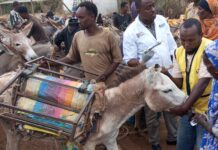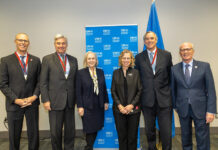By Arasha Soila
Nairobi, Kenya: The 8th Global Forum on Remittances, Investment, and Development (GFRID) Summit 2023 happened recently. The summit was convened jointly by IFAD, the UN Office of the Special Adviser on Africa, and the World Bank and took place at the United Nations Office in Kenya.
The GFRID Summit brought together over 500 delegates from both the public and private sectors and civil society to improve the understanding of migrant and diaspora contributions to sustainable development.
The Summit also focused on promoting both African and global best practices to reduce the cost of remittances while fostering financial inclusion. According to data from World Bank, global remittances to low and middle-income countries had increased to US$626 billion in 2022.
Further, a report by the UN states that, globally, 800 million people live in households receiving international remittances. The fast increase in remittances demonstrates migrants’ resilience and the significant contribution they make to their families and countries of origin. Migrants remain key contributors to sustainable development.
Remittances and diaspora investment represent a significant inflow for African markets and are great contributors to income for millions of individuals and families. The 2023 GFRID summit particularly focused on Africa as 17 out of its 54 countries rely on remittances for at least 4 % of their GDP according to a report by RemitSCOPE Africa. One out of five Africans are directly involved in either sending or receiving remittances.
Remittances play an important role in achieving the SDGs by providing a source of income to support basic needs, supporting economic growth, job creation, and social development. According to a report by IFAD, remittances allow families to fight poverty (SDG1), put food on the table (SDG2), pay medical and education expenses (SDGs 3 and 4), gender equality (SDG5) all contributing to human capital development.

Remittances also contribute importantly to reducing inequalities (SDG10) by providing a source of income to families that may be excluded from formal financial systems.
Additionally, they help by supporting sustainable agricultural practices which in turn enable communities to adapt to climate change (SDG13). IFAD observes that one-quarter of the money saved from the remittances goes into agricultural-related investments.
Speaking during the Summit, IFAD President, Alvaro Lario stressed that migrant workers are key development contributors. He further highlighted the potential of remittances and diaspora investments in paving the path towards achieving SDGs, especially in rural areas, where half these funds flow. “Our mission as IFAD is to invest in rural people. It is in rural areas that remittances can help make migration more of a choice than a necessity for future generations,” he emphasized.
Despite the multiple benefits of remittances, there are still significant challenges to fully enabling access to and use of formal remittance channels. High transfer costs, lack of transparency, security, and convenience to send money home are some of the challenges which hinder the full transformational potential of these flows. Africa remains the most expensive region to send money to, at an average cost of 8.46 % above the global average of 6.3 %.
Cristina Duarte, the UN Secretary General’s special adviser for Africa said that finding cheaper and faster solutions to send money into Africa and within Africa is the key to building up remittances. “Remittances are a significant source of funds for Africa and have exceeded the level of overseas development assistance,” she noted.
It was also noted that Kenya is the 3rd largest recipient of diaspora remittances in Sub-Saharan Africa. Remittances in Kenya are the highest foreign earners following its major exports tea and coffee. They have boosted Kenya’s foreign exchange reserves, stabilized the shilling, and supported the country’s balance of payments. PS for the State Department of Diaspora Affairs, Roseline Njogu, spoke on the importance of recognizing migrants by stating that the government of Kenya intends to engage the Kenyan Diaspora in a more constructive way to unlock their full potential.

Speakers at the GFRID Summit 2023
In his remarks, Patrick Njoroge, Governor of the Central Bank, highlighted that 49% of the remittances received in Kenya go to food consumption and medical expenses mainly. He also pointed out that the adoption of technology in Kenya has helped reduce the cost of remittances. Additionally, the CBK Governor announced that the government of Kenya will soon launch a Central Securities Depository that will enable the Diaspora to easily invest in government securities.
Digital platforms are bringing down the cost of remittances as digitalization plays an increasingly important role in linking remittances with financial services and products. Digitalization of remittances reduces the time and cost of sending and receiving money. These digital channels have provided access to financial services to millions of migrants and their families who previously were excluded from traditional banking systems.
Digitalization of remittances can leverage other financial services such as savings, credit, insurance, or housing which offers financial inclusion. IFAD continues redoubling its efforts to reduce the cost of sending remittances by adopting digital solutions and promoting digital and financial inclusion. The president of IFAD has reaffirmed the Fund’s commitment to making the remittances flow faster and safer while reducing transfer fees.
“Digital platforms are helping bring down transfer costs, so bridging the divide is critical so that recipients can harness the power of remittances. The International Organization for Migration recognizes how migrants importantly contribute to sustainable development and are often agents of change and innovation,” reiterated Ugochi Daniels, Deputy Director General of IOM.
Addressing policy and regulatory issues, as well as innovative tools in both sending and receiving markets can enable competition hence reducing remittance costs. Remittances are a lifeline to so many families. The hard-earned money sent by migrants every day to their families represents a vital economic lifeline for millions of struggling families around the world.













